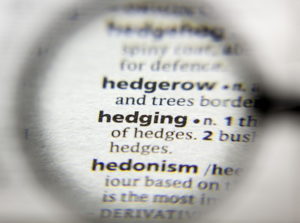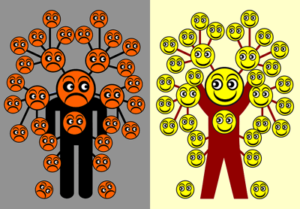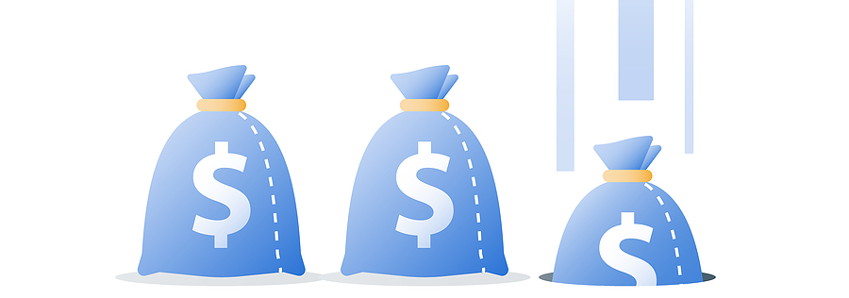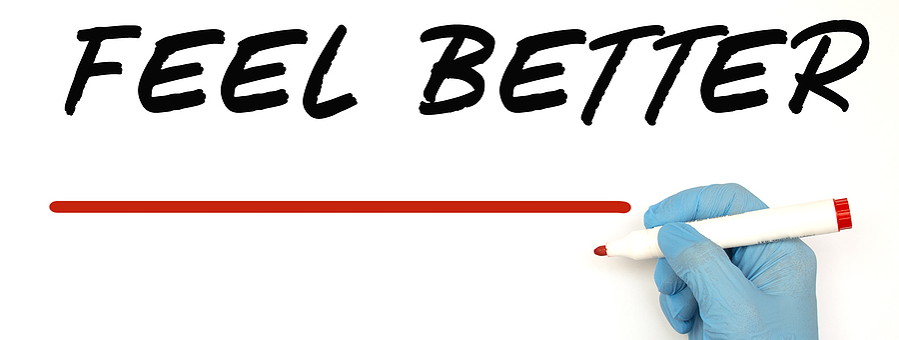 In the world of betting, anyone sensible would tell you that the best thing that you can do is to avoid allowing your emotions to play a part in the bets that you place. In reality, there are countless people out there that do the exact opposite, fully aware that what they’re doing is not good betting practice. The idea behind compensational betting, which is sometimes referred to as emotional hedging, is that you place a wager on the opposite of what you actually want to happen. In other words, you place a bet that you hope doesn’t actually win.
In the world of betting, anyone sensible would tell you that the best thing that you can do is to avoid allowing your emotions to play a part in the bets that you place. In reality, there are countless people out there that do the exact opposite, fully aware that what they’re doing is not good betting practice. The idea behind compensational betting, which is sometimes referred to as emotional hedging, is that you place a wager on the opposite of what you actually want to happen. In other words, you place a bet that you hope doesn’t actually win.
It is entirely fair to say that this type of betting is done in direct contradiction of what any top quality bettor would tell you you should do. The very best punters out there will have a plan for the bets that they want to place, with those plans usually being based around a lot of research and looking at all of the different markets. The very notion of placing a bet that you hope doesn’t win goes against what the bettors that win all the time would ever do, yet for those that place such bets it makes complete sense as an emotional hedge.
The Idea Behind Hedging
 In order to understand why some people might choose to place an emotional hedge and the psychology behind such a decision, it helps to have a good idea of what hedging actually is. If you’ve ever heard the phrase ‘hedging your bets’ then you’ll have a good idea of what we’re talking about, especially if you’ve also understood the context in which said phrase is used. Hedging is common in the stock market, with investors using a hedge as a way of protecting their stock, given the fact that it is a risk-management strategy.
In order to understand why some people might choose to place an emotional hedge and the psychology behind such a decision, it helps to have a good idea of what hedging actually is. If you’ve ever heard the phrase ‘hedging your bets’ then you’ll have a good idea of what we’re talking about, especially if you’ve also understood the context in which said phrase is used. Hedging is common in the stock market, with investors using a hedge as a way of protecting their stock, given the fact that it is a risk-management strategy.
In the world of the stock market, a hedge is used as a form of insurance. It doesn’t stop negative things from happening, but it does mean that the negative thing is able to have less of an impact on the person that placed the hedge. Investors will look to hedge one investment that they’ve made by making a trade into a different investment that would work in a diametrically opposed manner. This does, of course, mean a reduction in the potential profits that you would gain if your original investment works out successfully.
In many ways, we all hedge in real life on a regular basis. You buy house insurance in order to hedge against your home being bamaged into or burning to the ground. We don’t want those things to happen, but we know that we need to protect ourselves against the possibility that they might. We will buy insurance before we go on holiday in case our flight is cancelled or we fall ill, hoping against hope that we never need to use the travel insurance but being acutely aware that we need to protect ourselves in case we do.
Emotional Hedging In The World Of Betting
 Now that we understand the idea behind hedging, we can speak more accurately about how emotional hedging works in the world of betting. In essence, it is the same sort of thing as we’ve already discussed, in which we take out an option that flies in the face of what we actually want to happen. The reason why we do it is that we want to give ourselves some protection against the possibility of something happening that we don’t want, meaning that we can at least feel a slight sense of comfort from what has happened.
Now that we understand the idea behind hedging, we can speak more accurately about how emotional hedging works in the world of betting. In essence, it is the same sort of thing as we’ve already discussed, in which we take out an option that flies in the face of what we actually want to happen. The reason why we do it is that we want to give ourselves some protection against the possibility of something happening that we don’t want, meaning that we can at least feel a slight sense of comfort from what has happened.
To put it another way, if we bet on our team to lose and it loses, the blow of the loss is softened. If you were to bet on the outcome that you actually want to happen, such as your favourite sports team winning a match, and the team loses, you have put yourself in a situation where you lose on two fronts. Not only has your team not won the game, but you’ve also lost your bet and the associated money. By betting against your desired outcome, you not only ensure you will be happy regardless of the outcome but you remove the all-or-nothing attitude of betting on them to win.
Why It Is So Powerful As An Option

Sports Psychologist Eric Morse said that emotional hedging had its merits. Speaking to ESPN, he said,
“You don’t want it to happen, but if it does you get to cash in and neutralize the pain. It’s buying insurance for your emotions. I love the Dolphins and I would pay a lot more than five dollars to ensure that they win.”
He was speaking about his love for the Miami Dophins American football team, but the same logic is true for the likes of Liverpool supporters or fans of the England cricket team. Whoever it is you’re rooting for, you cover yourself against a loss.
The reason emotional hedging is so powerful from a psychological point of view is that it allows you to feel like you’re in a win-win situation. Ultimately, you want your team to win and that goes without saying. If they don’t win, you’ll at least gain some money that will soften the blow of defeat. There is plenty of information out there about the number of people who engage in superstitious behaviour, so many will happily bet against their club in the hope that this will jinx things in their favour. That is especially true of those that don’t often win bets.
The psychology behind betting is an interesting field, which is why we’ve covered it in so much detail on this site. When it comes to emotional hedging, there is certainly an argument that it allows people to try to gain some control over something that that is entirely out of their control. The want to control their own emotions, for starters, so the idea becomes that they can stop themselves from being too upset by a loss if they have gained something in exchange. That ‘something’ comes in the form of cash from the bet that they placed.
It is common for many people to believe that they can ‘jinx’ things for their football club or sports team. The idea of lucky socks, wearing the same outfit as when the team won last time or engaging in some other action that is essentially pointless but makes people feel like they are in control is common place. We have covered it in more detail in our article entitled ‘Ritualistic Behaviours & Superstitions In Betting’, but the idea remains the same: people want a sense of control. That can be offered by emotional hedging just as much as by following a superstitious routine.
Is Emotional Hedging ‘Wrong’?
 There is no doubt that some people have a moral problem with emotional hedging. This isn’t moral in any real sense, but because it feels as though they’re being disloyal to their team by placing a bet against them. They are convinced that any winnings you receive as a result of an emotional hedge is ‘dirty money’. Those that disagree are quick to point out that such dirty money spends just as well as normal money, which is ultimately why many of us bet in the first place, in the hope that we can win money that gets added to our coffers.
There is no doubt that some people have a moral problem with emotional hedging. This isn’t moral in any real sense, but because it feels as though they’re being disloyal to their team by placing a bet against them. They are convinced that any winnings you receive as a result of an emotional hedge is ‘dirty money’. Those that disagree are quick to point out that such dirty money spends just as well as normal money, which is ultimately why many of us bet in the first place, in the hope that we can win money that gets added to our coffers.
It is not that the loss won’t still hurt those that place emotional hedges. A last-minute goal being scored will definitely continue to be heart-breaking, especially if you support a relegation-threatened team that needed the point to stay or up, say, or a title-chasing team that needed a win to stay in the race, only to see that snatched away. Even so, winning money will take the edge of the heart-break for most people, which is why it remains a way of approaching betting that has a psychological edge that can’t be rivalled.
It is not just sports betting this applies to either. Take, for example, the bet on zero in roulette (or zero and double zero in American roulette). If zero comes in then all bets other than those placed on zero itself will lose (red/back, odd/even, sections/rows, other numbers, etc). Therefore, by betting on zero you are taking insurance in case it comes in and your other bets lose, this reduces the overall loss and therefore pain and so could be a form of emotional hedging. Insurance bets are available for a lot of casino games and are popular for this reason.
Putting A Cost On Your Emotions

Part of the reason why the psychology of emotional hedging is so powerful is that it asks people to put a price on their emotions. How much money do you need to receive in order to feel less upset about an outcome? That is effectively what emotional hedging is asking the participants. You need to weigh-up how much money you need to receive in order to feel better alongside how much money you’d be willing to lose if your team did what you wanted it to do and won. Is there an amount that sits in the middle space?
The psychology behind such decision making is complicated, but it is fair to say that there is no one-size-fits-all answer. It is important to ensure that you don’t bet more money that you can afford to lose in order to see the amount that you’re winning be enough. For some supporters, there is no amount of money that will make them feel better about seeing their team lose, which is why they consider such winnings to be the equivalent of blood money. For others, there is an amount but the tinge of disappointment will never not be there.
Can There Be Rules For Emotional Hedging?
 Chad Millman, the journalist that wrote the ESPN piece mentioned elsewhere in this piece, suggested that there are some rules that need to be put in place for emotional hedging bets. The first thing he suggests is that you must only place an emotional hedge on occasions when the team that you support is the underdog. Millman’s logic for this line of thinking is that placing a bet against your team when it is the underdog means that you’re betting on a match that you expected them to lose in the first place, so it’s less painful.
Chad Millman, the journalist that wrote the ESPN piece mentioned elsewhere in this piece, suggested that there are some rules that need to be put in place for emotional hedging bets. The first thing he suggests is that you must only place an emotional hedge on occasions when the team that you support is the underdog. Millman’s logic for this line of thinking is that placing a bet against your team when it is the underdog means that you’re betting on a match that you expected them to lose in the first place, so it’s less painful.
Keeping your bet relatively low will mean that you don’t lose too much money if your team does the improbably and wins the match that they are the underdog in, whilst your euphoria at seeing them pick up an unexpected win makes the monetary loss easier to swallow. As part of this, Millman believes that punters should always know their limits. You need to not only assess your own bankroll management but also weigh up how much you can lose before losing the money thanks to your team winning makes you sad anyway.
He is of the opinion that most people are shallower than they think in terms of how much money they can receive that will soften the blow of a defeat. In psychological terms, some people are willing to move on from a defeat if they feel as though they’ve won in another way. Whilst a financial reward isn’t as good as seeing your team win, it can offer a psychological victory that sees people feel less angry about the defeat or dropped points that the team that they are emotionally attached to has suffered.
It Is About Making Yourself Feel Better

You can read about loss aversion elsewhere on this site, but the basic idea of it that losing something causes more pain than gaining the same thing can feel good. As a result, some people would rather not lose more than they would want to win. On top of this, the psychological phenomenon known as diminishing margin utility means that the loss doesn’t feel as painful when you’ve won. In other words, we all want to minimise our potential losses, which is what you’re doing when you bet against your side.
Ultimately, the idea behind such compensational betting is to make yourself feel better. This fact can be shown in an experiment carried out in the United States of America. Hockey fans in the city of Boston were asked if they would take a bet that saw $5 paid to Doctors Without Borders if the team that they supported lost, with 95% of them accepting the bet. When they were offered the same bet but with $5 going into their own pocket, only 41% of them accepted. In the end, they wanted to feel like they were doing something good in exchange for their team losing.
